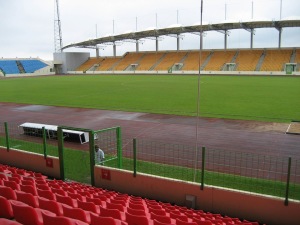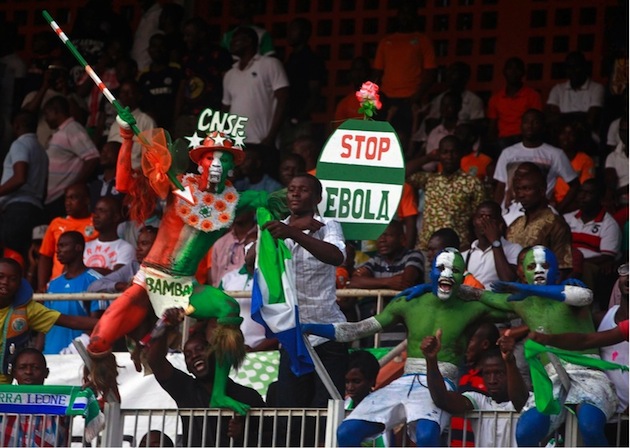
The Confederation of African Football has announced that Equatorial Guinea will replace Morocco as host nation for the 2015 African Nations Cup, the continent’s oldest and most prestigious international tournament.
The decision followed “fraternal and fruitful discussions” between CAF and Equatorial Guinea’s President Obiang, according to CAF’s official statement. Matches will be played in Malabo, Bata, Mongomo and Ebebiyin. The draw is scheduled for December 3 in Malabo.
The oil-rich former Spanish colony, population 736,000, previously co-hosted the tournament, with Gabon, in 2012.
CAF’s announcement brought a controversial and increasingly tense saga to a close. Morocco’s decision to back out of its commitment to stage the Nations Cup came in the wake of the Ebola outbreak in West Africa. The North African nation’s withdrawal drew passionate criticism from many fans and observers in Africa and overseas.
Writing for The Guardian’s Comment is Free, Sean Jacobs (the South African founder of the Africa Is A Country website) argues that “a mix of politics, opportunism and self-interest seem to be behind Morocco’s decision.”
The incident, Jacobs explains, is evidence of Morocco’s “difficult relationship with nations south of the Sahara. African migrants, some on their way to Europe, regularly complain about harassment, violence and xenophobia.”
James Dorsey’s The Turbulent World of Middle East Soccer blog took a similar tack. “Morocco can’t escape the impression that its decision was informed by prejudice,” especially within the context of a long and complex history of economic, cultural, and political relations between North African countries and sub-Saharan African nations. And, of course, fear shaped the decision as well. Fear, specifically, “about the possible impact of an Ebola case on tourism that accounts for an estimated ten percent of Morocco’s gross domestic product.”
Morocco’s seemingly contradictory decision not to host the Nations Cup in January but to go ahead and stage the FIFA World Club Cup next month sparked more criticism.
In the end, Africa’s grandest football show will go on thanks to Issa Hayatou, CAF’s president for the past 26 years, and President Obiang, Africa’s longest serving autocrat–in power since 1979 and at the head of the ruling Democratic Party of Equatorial Guinea that holds 153 of 155 parliamentary seats.
This last-minute African Nations Cup resolution reminds me of FIFA General Secretary Jerome Valcke’s statement during the massive 2013 Confederations Cup protests in Brazil: “less democracy is sometimes better for organizing a World Cup.” And, in this case, it seems to work for an African Nations Cup too.
Tag: Ebola

Spectators went beyond the usual gamesmanship at Sierra Leone’s practice in Yaoundé, Cameroon: chants of “Ebola, Ebola” rained on the visitors. “You feel humiliated, like garbage, and you want to punch someone,” said John Trye, a reserve goalkeeper, speaking to Jeré Longman of The New York Times (click here to read the article).
Two months ago, Sierra Leone had reached number 50 in FIFA’s world ranking–an excellent result for a country ranked 183rd in the Human Development Index. Coached by Johnny McKinstry, an ambitious 29-year-old from Belfast, the team seemed poised to qualify for the 2015 African Nations Cup before the catastrophic Ebola outbreak in West Africa.
The Confederation of African Football decreed that Sierra Leone’s Nations Cup home qualifiers had to be played outside the country. When the team journeyed to Lubumbashi, Democratic Republic of Congo, to play a “home” match against the DRC, midfielder Khalifa Jabbie reported that “they treated us like aliens.” In Abidjan, the Ivory Coast players opted for fist-bumps with their opponents instead of shaking hands; fans in the stands taunted the visitors with “Stop Ebola” signs and insulting chants (see photo above).
Already facing stiff competition in a qualifying group that includes Ivory Coast and Cameroon, the itinerant Sierra Leoneans lost matches and became demoralized. “The players tried their very best but sometimes what the mind’s willing to do, the body simply can’t anymore,” said their Irish coach. Making matters worse, a couple of weeks before Sierra Leone’s away match in Cameroon, McKinstry was fired with a curt email from the sports ministry, which then fought publicly with the country’s Football Association over the selection of his successor.
While Sierra Leonans have much more serious matters to deal with than sport, the stigma and fear associated with Ebola is also denying emotional solace to a nation generously endowed with football passion and patriotism. As their new coach, Atto Mensah, put it, “This is the only way we can make people happy. We owe them joy.”